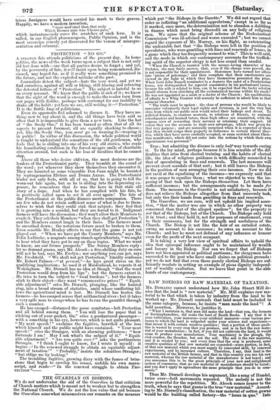PROTECTION " NO GO."
A STRANGE fate attends politicians of the present day. In home politics, the news of the week turns upon a subject that is not only old but done with—one that all parties desire to forget ; and yet, i by the perversity of fate, it will insist upon being remembered, dis- cussed, nay hoped for, as if it really were something promised in the future, and not the exploded mistake of the past.
Journalists detest the subject—hate the very word, and yet we find ourselves, against all will or liking, still tracing and retracing the detested letters of "Protection." The subject is hateful to us on every account. We know that the public is sick of it; we know that the sight of the word is enough to make the reader turn from our pages with dislike, perhaps with contempt for our inability to shake off the habit : yet here we are, still writing it—" Protection." It is the Bottle Imp of politicians.
Even its opponents feel ashamed to discuss it. They have no- thing new to say about it, and the old things have been said so often that it is impossible to give them a new turn. Like the hat of " the Seedy One," it has been turned so often that of all its aspects to present foremost, all are equally shocking to choose ; yet, like the Seedy One, you must go on wearing it—wearing it, in public ! In virtue of this discussion, the whole political world is taught to understand the sensations Of the old gentleman, who feels that he is sliding into one of his very old stories, who reads his humiliatinr, condition in the forced meagre smile of charitable attention around, but such is his loss of faculties that he cannot stop. Above all those who desire oblivion, the most desirous are the leaders of the Protectionist party. They tremble at the sound of the word ; yet wherever they show themselves they encounter it. They are haunted as some venerable Don Juan might be haunted by septuagenarian Elviras and Donna Annas. The Protectionist leader not only feels, with all of us, that he is going to tell the worn-out tale again, but as he is sliding into the depressing ex- posure, he remembers that 1:e was the hero in that stale old story of a dupe. And when he has complied with his fate, he is positively called upon to act it all over again ! The fate of the Protectionist at the public dinners merits compassion. There are few who do not retain sufficient sense of what is clue to them- selves to wish that they could sink that subject ; they feel that it is growing into a scandal, but they are forced to it. Indignant farmers will have the discussion ; they won't allow their Members to evade it. They ask their Members "when they shall get Protection "; and the Members cannot laugh in their faces. The farmers must be smoothed down ; the notorious future must be broken to them. Even sensible Mr. Henley affects to say that the game is not yet played out. " When we have got the County Members," says Mr. Felix Ladbroke, a magnate among stanch agriculturists, "we ought to hear what they have got to say on these topics. What we want to know, are our future prospects." The Surrey Members reply : let us demand guano, says Mr. Alcock ; a five-shilling duty on corn will not be bad, says Mr. Evelyn ; nor any-thing you can get, says Mr. Freshfield. " We shall not get Protection,' timidly confesses Mr. Robert Palmer—" at present,"—he lays great stress on the qualifying implication ; he used it at Maidenhead, he repeats it at Wokingham. Mr. Disraeli has no idea at Slough " that the word Protection would drop from his lips"; but the farmers extort it. He tries to turn the subject to "local burdens " ; but the farmers stick to their object—they want "remunerative prices !" " Equit- able adjustment !" cries Mr. Disraeli, plunging, like the hunted stag, into a broad stream of statistics, amid whose conflicting bil- lows the agricultural mind is lost. Mr. Disraeli has beaten the farmers—he has escaped across that arithmetical river ; but it takes a very agile man to escape when he has to rim the gauntlet through such a number.
He has escaped—distanced the posse comitatus—left Protection and all behind among them. " You will lose the paper that is sticking out of your pocket, Sir," cries a goodnatured passenger— with a something in his eye, however, which is not quite pleasant. " My next speech ! " exclaims the fugitive, horrified at the loss which himself and the public might have sustained. " Your next speech ! " cries the Stranger, with an alarming politeness ; " how fortunate I am ! May I ask what's the subject of it." "Equit- able adjustment." " Are you quite sure ?" asks the pertinacious Stranger. " I think I ought to know, for I wrote it myself : it begins--' In the renewed struggle to obtain an equitable adjust- ment of taxation." "Probably," insists the relentless Stranger; "but oblige me by looking." The trembling fugitive, growing dizzy with the fumes of brim- stone that begin to envelop his, senses, unfolds his own manu- script, and reads—" In the renewed struggle to obtain PRO- TECTION"


























 Previous page
Previous page